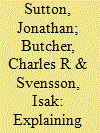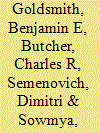|
|
|
Sort Order |
|
|
|
Items / Page
|
|
|
|
|
|
|
| Srl | Item |
| 1 |
ID:
155492


|
|
|
|
|
| Summary/Abstract |
Mindful of the growing interest in non-Western and pre-modern political systems, we propose a framework for the analysis of states, state systems, and international orders. We provide a culturally neutral definition of the state and outline a method for assessing variation in political organization both within and above the state. Our framework cleanly delineates hierarchy from anarchy and can be applied to a diverse set of state systems. We then show how the content of international order inter-relates with system structure and the local density (interaction capacity) of a region. We argue that our framework captures similarities—and exposes differences—between different systems and orders over time and space. It strikes a balance between the traditional focus on the Western experience and the current trend toward regional studies in which it is difficult to accumulate knowledge in a rigorous manner.
|
|
|
|
|
|
|
|
|
|
|
|
|
|
|
|
| 2 |
ID:
134150


|
|
|
|
|
| Publication |
2014.
|
| Summary/Abstract |
The use of violent coercion to repress unarmed protests, such as that seen during the Arab Spring, sometimes backfires on the government - an outcome called 'political jiu-jitsu'. Examining unique global data covering extreme violence used by governments against unarmed protests from 1989 to 2011 (drawn from UCDP) and the Nonviolent and Violent Campaigns and Outcomes (NAVCO) data, this study aims to explain the conditions under which this outcome occurs. This study contributes to both the nonviolent action and one-sided violence literatures by further disaggregating this effect into both domestic and international outcomes, a distinction that has not previously been made in empirical studies. We find evidence that a pre-existing campaign infrastructure increases the likelihood of increased domestic mobilization and security defections after violent repression, but is unrelated to international backlash. Within ongoing NAVCO campaigns we find that parallel media institutions increase the likelihood of increased domestic mobilization and international repercussions after repression, and that this effect holds true for both traditional media and 'new' (i.e. internet-based) media. One of the novel contributions of this study is that we identify an important selection effect in the NAVCO data and the critical role of organizational infrastructure, especially communications infrastructure, in generating preference changes that create the conditions where killing unarmed civilians becomes costly for repressive governments. We conclude with a discussion of the potential implications of this study and avenues for future research.
|
|
|
|
|
|
|
|
|
|
|
|
|
|
|
|
| 3 |
ID:
122897


|
|
|
|
|
| Publication |
2013.
|
| Summary/Abstract |
We present what is, to the best of our knowledge, the first published set of annual out-of-sample forecasts of genocide and politicide based on a global dataset. Our goal is to produce a prototype for a real-time model capable of forecasting one year into the future. Building on the current literature, we take several important steps forward. We implement an unconditional two-stage model encompassing both instability and genocide, allowing our sample to be the available global data, rather than using conditional case selection or a case-control approach. We explore factors exhibiting considerable variance over time to improve yearly forecasting performance. And we produce annual lists of at-risk states in a format that should be of use to policymakers seeking to prevent such mass atrocities. Our out-of-sample forecasts for 1988-2003 predict 90.9% of genocide onsets correctly while also predicting 79.2% of non-onset years correctly, an improvement over a previous study using a case-control in-sample approach. We produce 16 annual forecasts based only on previous years' data, which identify six of 11 cases of genocide/politicide onset within the top 5% of at-risk countries per year. We believe this represents substantial progress towards useful real-time forecasting of such rare events. We conclude by suggesting ways to further enhance predictive performance.
|
|
|
|
|
|
|
|
|
|
|
|
|
|
|
|
|
|
|
|
|